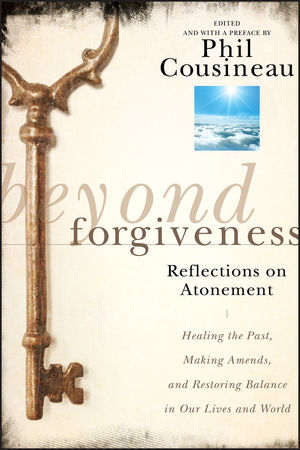Beyond Forgiveness: Reflections on AtonementISBN: 978-0-470-90773-3
Paperback
272 pages
January 2011, Jossey-Bass
 This is a Print-on-Demand title. It will be printed specifically to fill your order. Please allow an additional 10-15 days delivery time. The book is not returnable.
|
||||||
Connect with Wiley Publicity
"If we harbor thoughts of violence or hatred, or seek revenge or retribution, we are contributing to the wounding of the world; if we transform those thoughts into forgiveness and compassion, and then move beyond them to actually make amends or restitution; we are contributing to the healing of the world. This timely, powerful and compassionate book helps show us the way."
—Deepak Chopra
15 Illustrious Thinkers Pave a Path for Reconciliation and Peaceful Future In a time where requests for forgiveness are met without true reconciliation, where high profile, nationwide apologies elicit a meek response of indifference, there arises a need for something deeper. In February 2010 golf phenomenon Tiger Woods publicly asked for forgiveness for his extramarital affairs, and a nation yawned. In March 2009, money broker Bernie Madoff pleaded guilty to defrauding thousands of investors of billions of dollars, apologized to his victims and added, "I know that doesn't help you.” So what is missing? For 15 prestigious visionaries who point the way towards healed relationships, peaceful communities and a world beyond forgiveness, the answer resides in one word: “atonement.” Atonement – what the much-overlooked aspect of the reconciliation process and is the focal point of Forgiveness thinkers and activists such as Michael Lerner acts of atonement – making amends, providing restitution, restoring balance – can relieve us of the pain of the past and give us a hopeful future. In one excerpt, Azim Khamisa tells of meeting Tony, the murderer of his son, Tariq, and offering Tony a job in his foundation to help the cause of ending youth violence once he gets out of prison. This will give Tony an avenue of atonement – to give back in redemption for his actions. The incidents of atonement and lack thereof are found within every corner of our society. As in many stories of our culture and movies of our time, the 2007 movie message of atonement. After spending years in California, a guilt-ridden Amir returns to his Afghanistan homeland to rescue the son of his old friend Hassan. The act of liberating the boy is his way to redeem himself and – as a mutual friend indicates – to find “a way to be good again.”



